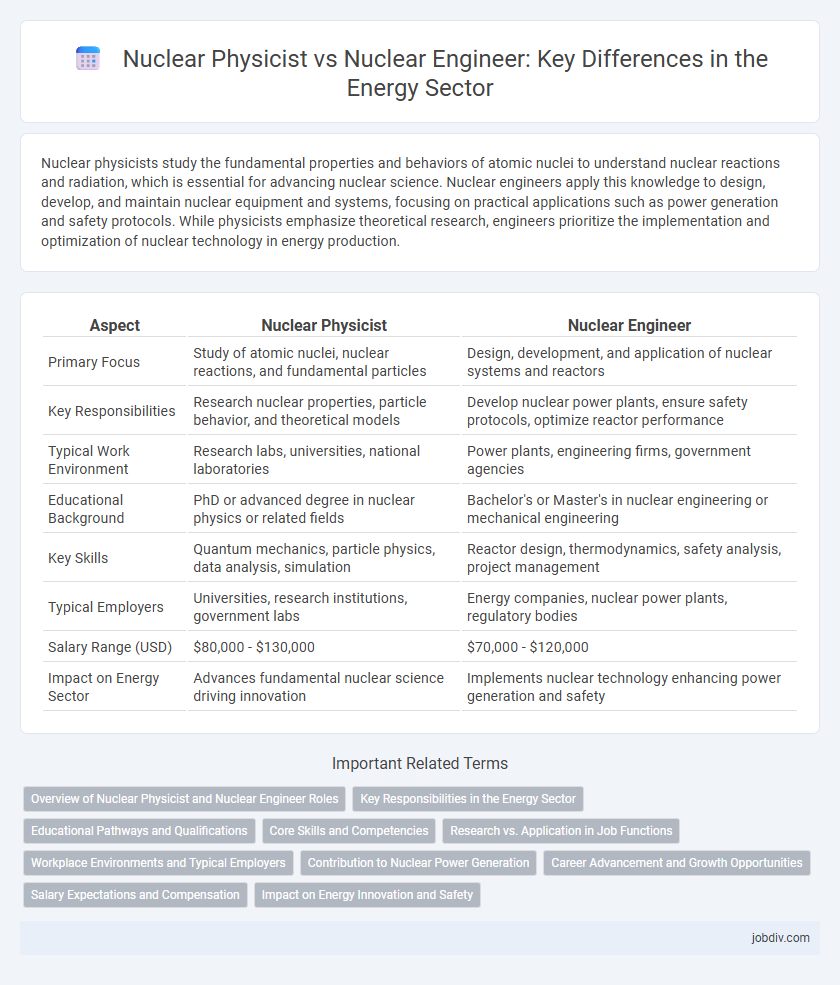Nuclear physicists study the fundamental properties and behaviors of atomic nuclei to understand nuclear reactions and radiation, which is essential for advancing nuclear science. Nuclear engineers apply this knowledge to design, develop, and maintain nuclear equipment and systems, focusing on practical applications such as power generation and safety protocols. While physicists emphasize theoretical research, engineers prioritize the implementation and optimization of nuclear technology in energy production.
Table of Comparison
| Aspect | Nuclear Physicist | Nuclear Engineer |
|---|---|---|
| Primary Focus | Study of atomic nuclei, nuclear reactions, and fundamental particles | Design, development, and application of nuclear systems and reactors |
| Key Responsibilities | Research nuclear properties, particle behavior, and theoretical models | Develop nuclear power plants, ensure safety protocols, optimize reactor performance |
| Typical Work Environment | Research labs, universities, national laboratories | Power plants, engineering firms, government agencies |
| Educational Background | PhD or advanced degree in nuclear physics or related fields | Bachelor's or Master's in nuclear engineering or mechanical engineering |
| Key Skills | Quantum mechanics, particle physics, data analysis, simulation | Reactor design, thermodynamics, safety analysis, project management |
| Typical Employers | Universities, research institutions, government labs | Energy companies, nuclear power plants, regulatory bodies |
| Salary Range (USD) | $80,000 - $130,000 | $70,000 - $120,000 |
| Impact on Energy Sector | Advances fundamental nuclear science driving innovation | Implements nuclear technology enhancing power generation and safety |
Overview of Nuclear Physicist and Nuclear Engineer Roles
Nuclear physicists study atomic nuclei to understand fundamental particles and nuclear reactions, advancing theoretical research and applications in energy production and medical technology. Nuclear engineers design, develop, and maintain nuclear systems, including reactors and safety protocols, ensuring efficient and safe use of nuclear energy. Both roles collaborate closely to drive innovation, with physicists focusing on scientific principles and engineers on practical implementation in energy sectors.
Key Responsibilities in the Energy Sector
Nuclear physicists in the energy sector primarily conduct research on atomic particles, nuclear reactions, and radiation to enhance reactor efficiency and safety through theoretical and experimental analysis. Nuclear engineers apply this scientific knowledge to design, develop, and maintain nuclear power plants and systems, ensuring compliance with safety regulations and operational standards. Both roles are critical for advancing nuclear technology, with physicists focusing on foundational science and engineers on practical implementation and system optimization.
Educational Pathways and Qualifications
Nuclear physicists typically pursue advanced degrees in physics, with a strong emphasis on nuclear theory, particle interactions, and radiation phenomena, often culminating in a Ph.D. Nuclear engineers follow a more application-focused educational pathway, earning a bachelor's or master's degree in nuclear engineering that covers reactor design, radiation safety, and thermodynamics. Both fields require rigorous training in mathematics and physical sciences, but nuclear physicists prioritize research and theoretical modeling, while nuclear engineers concentrate on practical implementation and system design within the energy sector.
Core Skills and Competencies
Nuclear physicists specialize in understanding atomic nuclei behavior, requiring strong analytical skills, quantum mechanics knowledge, and expertise in particle interactions. Nuclear engineers focus on designing and maintaining nuclear systems, emphasizing applied mathematics, reactor physics, and safety protocols. Both disciplines demand proficiency in radiation principles, problem-solving abilities, and adherence to regulatory standards.
Research vs. Application in Job Functions
Nuclear physicists concentrate on researching the fundamental properties and behaviors of atomic nuclei, advancing theoretical models and experimental techniques to understand nuclear reactions and radiation. Nuclear engineers apply this scientific knowledge to design, develop, and optimize nuclear reactors, safety systems, and radiation technologies for practical energy production and medical uses. The distinction lies in research-driven exploration versus application-focused problem solving within the nuclear energy sector.
Workplace Environments and Typical Employers
Nuclear physicists primarily conduct research in academic institutions, government laboratories, and nuclear research facilities, focusing on theoretical and experimental aspects of atomic nuclei. Nuclear engineers typically work in power plants, engineering firms, and regulatory agencies, applying physics principles to design, develop, and maintain nuclear systems and safety protocols. Both professionals often collaborate within energy sector companies, national laboratories, and defense organizations to ensure safe and efficient nuclear technology applications.
Contribution to Nuclear Power Generation
Nuclear physicists contribute to nuclear power generation by researching atomic reactions and advancing nuclear fission technology to enhance reactor efficiency and safety. Nuclear engineers apply these scientific principles to design, build, and maintain nuclear reactors, ensuring optimal performance and regulatory compliance. Both roles are critical in developing sustainable and reliable nuclear energy systems.
Career Advancement and Growth Opportunities
Nuclear physicists primarily engage in theoretical research and experimental analysis to understand atomic behaviors, leading to opportunities in advanced scientific research, academia, and specialized national laboratories. Nuclear engineers apply principles of nuclear physics to design, develop, and maintain nuclear systems, with career growth often linked to project management, regulatory compliance, and positions in power plants or government agencies. Career advancement for nuclear engineers tends to be more structured and industry-oriented, while nuclear physicists may experience growth through publications, grants, and interdisciplinary collaborations in scientific innovation.
Salary Expectations and Compensation
Nuclear physicists typically earn a median salary around $120,000 annually, reflecting their expertise in theoretical research and experimental analysis of atomic nuclei. Nuclear engineers command slightly higher salaries, with median compensation near $130,000 due to their role in designing and maintaining nuclear power systems and ensuring operational safety. Compensation packages for both professions may include bonuses, research grants, and government incentives, often influenced by industry demand and geographic location.
Impact on Energy Innovation and Safety
Nuclear physicists drive energy innovation by advancing the fundamental understanding of atomic interactions, enabling breakthroughs in nuclear fusion and reactor design that enhance efficiency and sustainability. Nuclear engineers translate these scientific discoveries into practical technologies, developing and maintaining safety systems that prevent accidents and manage radioactive waste effectively. Together, their combined efforts ensure the continuous improvement of nuclear energy systems, balancing cutting-edge innovation with stringent safety standards.
Nuclear Physicist vs Nuclear Engineer Infographic

 jobdiv.com
jobdiv.com